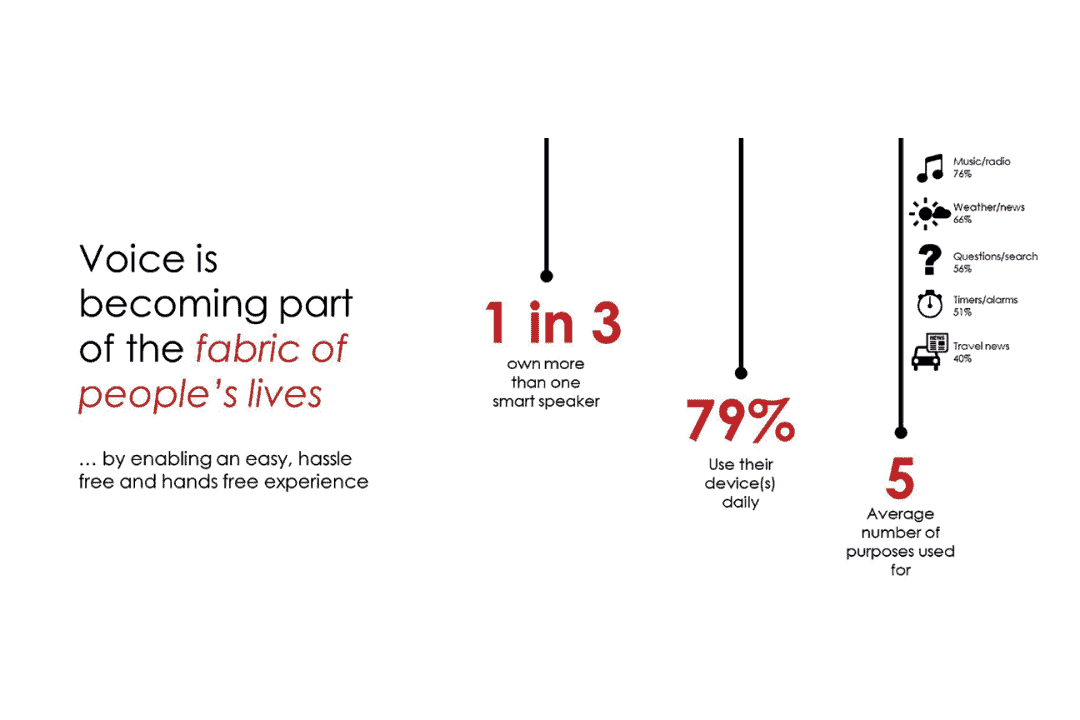Rowena Patterson, Head of Consumer Research, Simpson Carpenter, shares research into the area of voice commerce.
In the retail world, we’ve become used to hearing overhyped expectations about the latest tech. Remember Google Glass? It wasn’t all that long ago that some were predicting these devices would revolutionise the in-store experience. It hasn’t turned out that way though.
But one emerging technology I believe will buck this trend is voice interaction. The evidence is mounting that voice has already become more than just a fad. At the current rate of growth, by 2022 almost half of UK households are expected to own a smart speaker, increasing the v-commerce market from just £200m today to £3.5bn.
Amazon’s Echo currently leads the space. The ecommerce giant accounts for 41% of global smart speaker sales (followed by Google on 27%), giving it an edge in the race to bring consumers into its voice shopping ecosystem.
The technology, and Amazon’s hold over it, represents a clear challenge to the retail sector. However, adoption of the tech and of v-commerce by traditional retailers has been very slow. Many are still unconvinced and waiting for more evidence over whether it can have a real impact on the point of purchase.
I believe this short-sighted attitude is holding back the development of what could be a vital new channel for traditional retailers, leaving them vulnerable as the ecommerce giants continue to drive the voice market forward.
So that we could begin to understand people’s attitudes towards voice technology and better identify how they are using their device, Simpson Carpenter conducted a study involving hundreds of smart speaker owners from across the UK. An overwhelming number expressed positive views towards their device, with 90% either saying they liked their smart speaker (50%) or they loved it (40%).
Consumers are often reticent when adopting new technology, but as they become more familiar with it, that gradually changes. The research found one in three already own more than one smart speaker and 44% said the amount they use it had increased over time as they have mastered the commands and discovered more they can do with it.
The impact of smart speakers can be felt on other tech in the home. Some 14% of respondents said owning a speaker meant they were able to use their laptop, PC and smartphone less.
SMART SPEAKERS WILL DISRUPT THE ENTIRE SHOPPING JOURNEY
The study also revealed the potential for voice interaction to drive digital commerce. More than a quarter of respondents (28%) are either already or would like to use voice to make purchases.
This growing demand for voice interaction spans the entire customer journey. At the pre-shop stage, 57% said they wanted to use their smart speaker to check prices and 44% wanted to use it for finding a store’s location or opening hours.
During the purchasing phase, 21% were interested in using their device for buying a product for the first time and 25% for making a repeat purchase. Some 42% wanted to use their device to check delivery status after making a purchase and a quarter wanted to use it for checking how to use a product.
The potential for voice interaction will grow as it becomes integrated into other technologies. For example, respondents in our study became more than twice as likely to order products and food and more than five times as likely to book transport when a screen is integrated alongside their virtual voice assistants.
The technology still isn’t perfect. The fact that over half of respondents complained that their smart speaker sometimes misinterprets what they say, and 16% complain of unreliable or inaccurate responses should be a concern for manufacturers. But the devices are evolving quickly, and as AI-based techniques continue to mature, these issues will gradually be resolved.
So, what are the key takeaways from our study? Firstly, there is genuine demand and positive feelings for smart speakers. When someone buys a device it quickly becomes an integral part of their homes and their lives. As they get used to their speaker, people use it more frequently, and there is not just demand for more basic tasks but for speakers to support on interactions across the shopping journey.
There is clearly an opportunity for retailers to use this fast-growing and versatile channel to transform the shopping experience and significantly improve their relationship with customers. Voice tech might be alien to most of us now but that doesn’t mean it won’t be in a few years’ time. A decade ago many people wouldn’t have dreamt of making a payment over their mobile phone. That hasn’t stopped millions doing it today and the ‘swipe’ becoming an established means of interaction.
We’re seeing some retailers taking tentative steps into the market by creating Alexa skills and getting themselves on Google Home, but that doesn’t come close to meeting the scale of the challenge and the opportunity. Retailers need to start investing heavily in voice as a key part of their omnichannel and marketing tech strategies, or risk handing Amazon yet another advantage in the race to capitalise on digital commerce.





